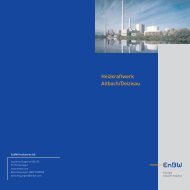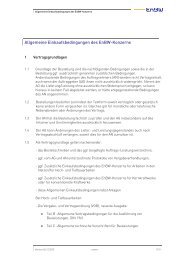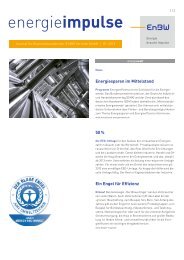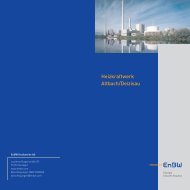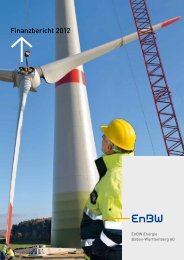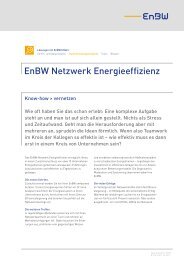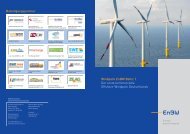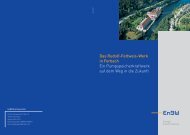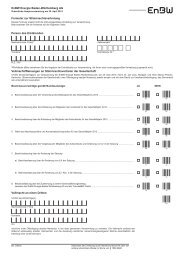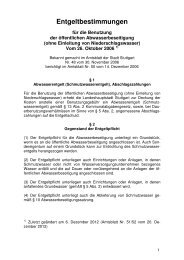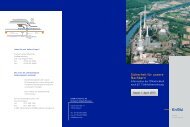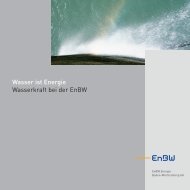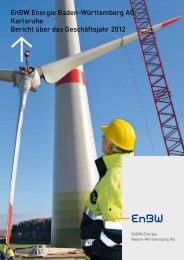2008 I 2009 Sustainability Report - Econsense
2008 I 2009 Sustainability Report - Econsense
2008 I 2009 Sustainability Report - Econsense
Create successful ePaper yourself
Turn your PDF publications into a flip-book with our unique Google optimized e-Paper software.
companies concerned within the framework<br />
of National Allocation Plans (NAPs). Companies<br />
who need more certificates than they<br />
have been allocated have to purchase additional<br />
certificates; companies who receive<br />
more certificates than they need can in turn<br />
sell certificates. All market participants are<br />
free to decide whether they buy emission<br />
certificates or implement emission reduction<br />
measures.<br />
Fermenter<br />
A fermentation tank – in a biogas plant, for<br />
example – in which biogas is produced from<br />
biomass. Biogas can be processed and upgraded<br />
to natural gas quality and used as a<br />
substitute for natural gas.<br />
Flue gases<br />
Flue gas is the term used to describe the<br />
waste gas occurring during combustion<br />
processes in power plants, waste incineration<br />
plants, production processes etc. (Postcombustion).<br />
Fuel cell<br />
Converts chemical energy into electrical energy<br />
and heat through reverse electrolysis.<br />
This efficient technology for decentral energy<br />
generation can be used to power appliances<br />
and automobiles as well as for the<br />
supply of electricity and heat in buildings<br />
and industry.<br />
German Energy Industry Act (EnWG)<br />
The EnWG, which came into force in July<br />
2005, created a regulatory framework for<br />
the supply of electricity and gas. The core<br />
elements of the Act are the definition of<br />
network operator obligations, rules governing<br />
network access and network fees, and<br />
the monitoring activities of the German<br />
Network Agency or the state regulatory<br />
authorities.<br />
German Energy-Saving Ordinance (EnEV)<br />
The amended EnEV legislation came into<br />
force on October 1, <strong>2009</strong> and now includes<br />
stricter requirements for the energy efficiency<br />
of new buildings and the modernisation<br />
of old buildings. In future, the energy<br />
requirement for heating and hot water in<br />
residential and non-residential buildings is<br />
to be reduced by an average 30%.<br />
German Renewables Act (EEG)<br />
The "EEG", the German Renewables Act, is<br />
designed to ensure the priority of electricity<br />
from all renewable energy sources like sun,<br />
wind, water, biomass and geothermal energy<br />
as well as sewage, pit and landfill gas. The<br />
legislation came into effect in 2000 with<br />
the aim of significantly increasing the share<br />
of renewables in overall electricity generation<br />
in Germany in line with the objectives<br />
formulated by the EU.<br />
Gigawatt (GW)<br />
One gigawatt equals one billion watts or one<br />
million kilowatts (kW).<br />
Greenhouse gases<br />
Greenhouse gases (GHG) caused by human<br />
activity influence the natural greenhouse<br />
effect. The increasing concentration of<br />
greenhouse gases in the atmosphere results<br />
in less heat being radiated back into space<br />
from the earth's surface, and this in turn<br />
leads to a rise in the average temperature on<br />
earth. The Kyoto Protocol defines the following<br />
relevant greenhouse gases: carbon dioxide<br />
(CO 2), methane (CH 4), dinitrogen oxide<br />
(N 2O), partially halogenated hydrofluorocarbons<br />
(HFCs), perfluorocarbons (PCFs) and<br />
sulphur hexafluoride (SF 6).<br />
Immissions<br />
Immissions are the effects of the emitted<br />
pollutants on plants, animals and humans<br />
as well as buildings once they have spread in<br />
the air, water or soil or have been chemically<br />
or physically transformed.<br />
Integrated Energy and<br />
Climate Package (IECP)<br />
At a policy meeting in Meseberg in August<br />
2007, the German government decided on<br />
the key elements of an Integrated Energy<br />
and Climate Programme (IECP). The programme<br />
jointly drawn up by the Federal<br />
Ministry of Economics and Technology and<br />
the Federal Ministry of Environmental Affairs,<br />
Nature Conservation and Reactor Safety<br />
took on concrete form in December 2007.<br />
It is a combination of promotion measures,<br />
economic instruments and regulatory<br />
measures covering energy production, energy<br />
efficiency, transport and private households,<br />
comprising a total of 29 individual<br />
measures.<br />
Intergovernmental Panel<br />
on Climate Change (IPCC)<br />
The IPCC was set up in 1988 by UNEP (United<br />
Nations Environmental Programme) and<br />
the WMO (World Meteorological Organisation).<br />
All countries who are members of<br />
these organisations can nominate scientists<br />
for the IPCC. The main remit of the IPCC is<br />
to assess the risks of climate change and to<br />
document avoidance strategies. The IPCC<br />
does not conduct its own research but collects<br />
the findings of research in the various<br />
disciplines, including in particular the field<br />
of climatology. It provides a coherent<br />
overview of this material in the IPCC Assessment<br />
<strong>Report</strong>s. These reports are prepared in<br />
working groups and approved in plenary<br />
session. All this takes place within the<br />
framework of a complex, multi-phase<br />
procedure involving lead authors and coauthors<br />
for individual articles, coordinators<br />
and lead authors for the overall report and<br />
independent experts for the individual sections<br />
and the report as a whole. These independent<br />
opinions are provided not only by<br />
the nominated and selected scientists but<br />
also by representatives of the governments<br />
of the member states.<br />
57



